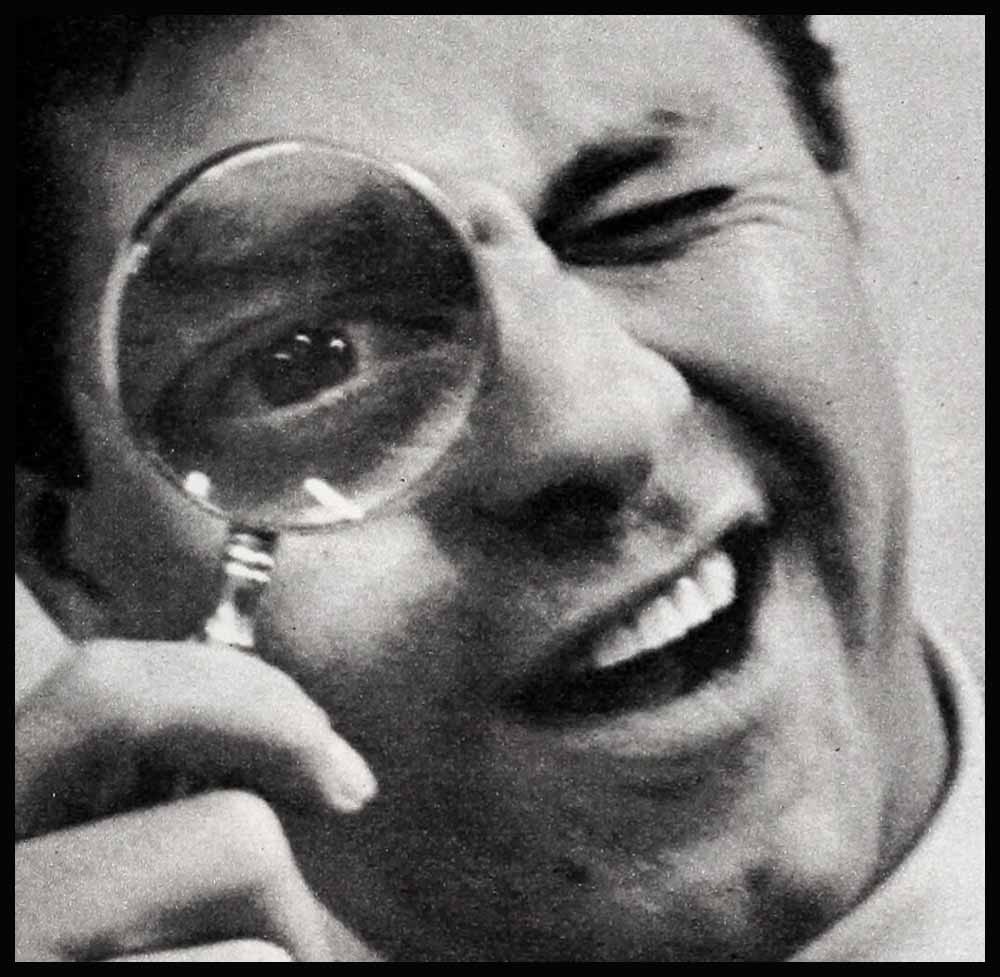
“I’m Not Jerry Lee Lewis,” Says Jerry Lewis
“Now get this straight,” Jerry sputtered into the phone. “The only thirteen-year-old girls I know are the ones my son Gary brings home on dates. My name is Jerry Lewis; I have no middle name; I’m married to an adult.”
For a moment Jerry stopped talking and listened, finally managing to say quietly, “I’m sorry you disbanded your Brooklyn Jerry Lewis Fan Club, Miss Reich. Now that you know I’m not Jerry Lee Lewis, I hope you’ll organize it again. Sure. . . . Of course. . . . Any time. Goodbye.” And Jerry hung up.
“At least I had a chance to straighten her out,” Jerry said to us, “but what about all the others who are confusing me with Jerry Lee Lewis? The ones who never call, never write, but just go on believing what they believe? How can I get through to them? I . . . Wait! Not a word!” He put his finger to his lips. With a wildly haunted expression, he glanced back over his shoulder. Getting stealthily to his feet, he went across the room and peered under the rug. He opened a desk drawer and looked inside it. He came over to me and examined the inside of my jacket pocket. “Just checking,” he whispered hoarsely. “Jerry Lee Lewis might be hiding here. I can’t get away from him!”
Returning to his chair, Jerry (no middle name) Lewis dropped the clown act and said to us seriously, “Look at this letter. Read the third paragraph.”
AUDIO BOOK
It said: “We thought you were the greatest. We saw your movies and TV shows and bought all your records. We even did our bit to support the muscular dystrophy drive because you headed it. Why did you let us down? Why did you leave Patti and four boys? Why did you run off and marry your thirteen-year-old cousin? We’ve lost faith in you and everything you have to do with.”
“Okay,” Jerry said, “one letter like that would be funny. Somebody joking—and I’d go along with the gag. But hundreds of them, that’s something else. Sure, I answer each letter personally. Patti’s helped, too. She adds a personal postscript to each one, saying: ‘I love Jerry; he loves me. We’ve been married fourteen years and expect to be together forever. You’re confusing him with another guy.’ And I give the facts to fans like Miss Reich who call me on the phone. But I repeat: How can I get through to the people who don’t phone, who don’t write, who just believe that I’m somebody else and are judging me by what that somebody else does?”
Jerry reached into his wallet with one finger, wriggled it around and said, “Jerry Lee, are you there?” Then he pulled out a press clipping. “It’s not just the marriage story that’s causing the mix-up,” he said. “It’s things like this, too.”
The headline, in big black type, said: “LEWIS BOOED IN LONDON.” The subhead read: “Singer Asked to Leave Country; $100,000 in Bookings Canceled.”
“Now, that appeared in the Los Angeles Times, practically my hometown paper,” Jerry explained. “The day the story came out, my phone never stopped ringing. ‘Friends’ called me up to give sympathy, offer advice, get more dirt. Some of them actually sounded disappointed when they learned that I hadn’t been run out of England, that the story was about Jerry Lee.”
From a briefcase he took another bunch of clippings. “This one has the lead: ‘Jerry Lewis found himself a new wife—before he got around to divorcing the old one.’ You can imagine how Patti felt when she read that.
“This one had direct quotes from ‘me.’ Listen to what I’m supposed to have said: ‘My wife is cute. She might look young and be young, but she’s grown. I was fifteen when I married the first time—too young. My wife was seventeen. That lasted a year. My second wife was seventeen, too. Lasted four years. This time I’ve found the right girl.’ ”
Jerry snatched out another clipping. “Listen to this one: ‘Jerry Lewis, self-styled bigamist, and his child bride left London by plane yesterday after the British virtually gave them the jolly old heave-ho. At Lewis’ last London theater appearance, Monday night, a member of the audience yelled: “Go home, you baby-snatcher!” And he went.’ ”
CLUE no. 1
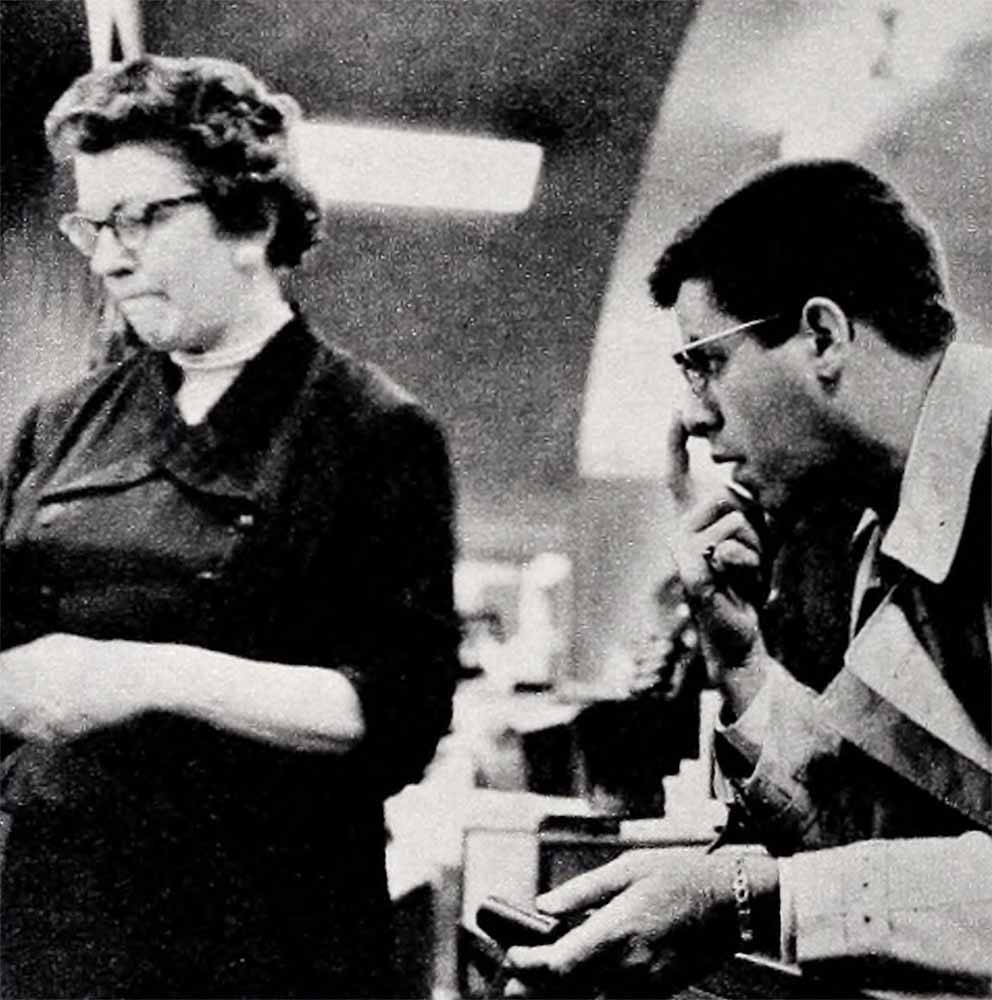
Shuffling the clippings together, Jerry started to stuff them back into his briefcase, then changed his mind and threw them into a wastepaper basket with a flourish. “The time for sitting and thinking is over. It’s time for action, I say!
“I’ve nothing against Jerry Lee Lewis personally. His life is his own and he’s entitled to lead it just like he wants to—as long as he doesn’t hurt anybody else. But my family is being hurt by all this.
“What I want to know: Is Jerry Lee Lewis really Jerry Lee Lewis? In other words, is that his right name? If he was born something else, and changed his name to Jerry Lee Lewis, I’ll take legal action to make him use another name. If Jerry Lee Lewis turns out to be his right name, well . . . We’ll cross that bridge when we come to it.
“Let’s find out if Jerry Lee is in town. If he is, we’ll go over and talk to him. But first,” Jerry said, “I got to go for my special trench coat.”
While Jerry was out of the room, a couple of his pals talked about the “Jerry Lee Lewis business.” “I’ve never seen Jerry so upset,” one of them said. “That London story, for instance. Jer happened to be there a short time before Jerry Lee was, and he made the biggest hit of his career. And it’s not just that some fans are threatening to boycott his pictures and TV shows. That’s bad enough. But worse than this to him, much worse, is the fact that he’s so proud of his family and so much in love with his wife that when anything threatens this happiness, he almost flips.”
Jerry came back into the room, wearing his trench coat. He picked up the phone, asked the hotel operator for a number, and waited. “Hi,” he said into the phone, “I’d like to talk to Jerry Lee Lewis. . . . Left town. When? . . . No, he couldn’t call me back—I’ll be leaving tomorrow for the Coast. Just tell him Mike Hammer called. Thanks.
CLUE no. 2
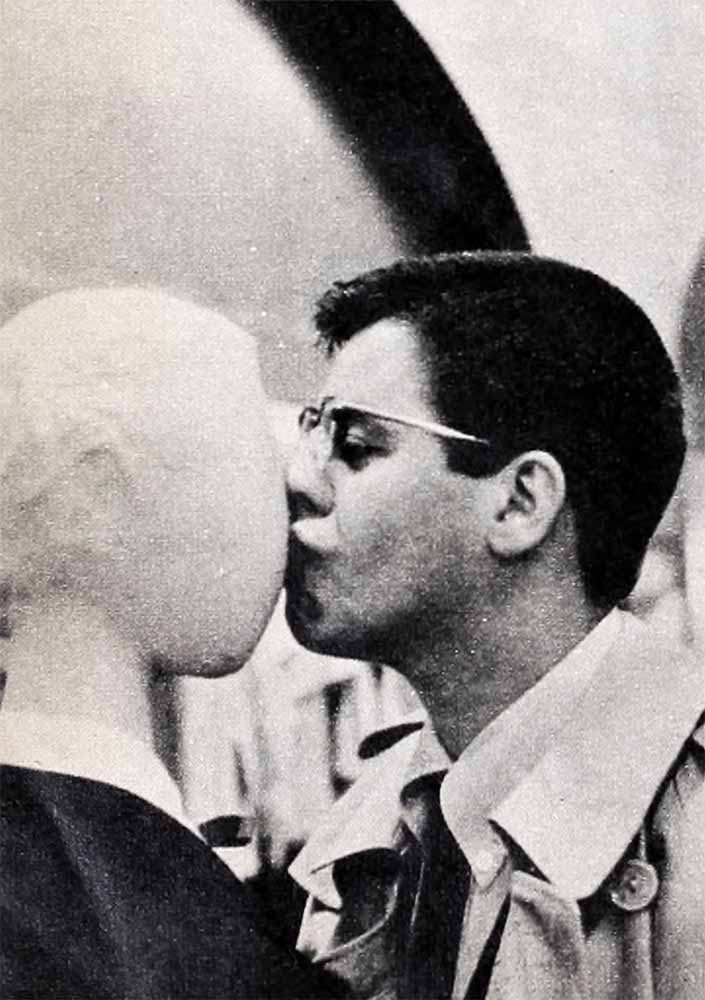
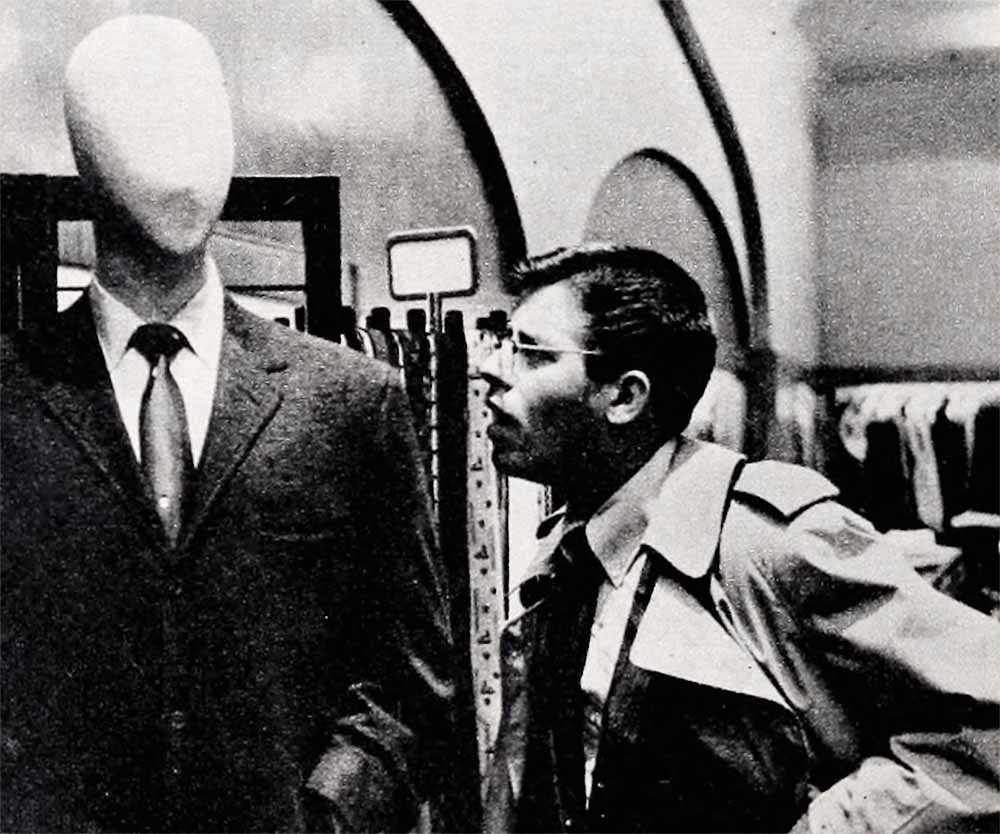
“It figures,” Jerry announced after he’d hung up. “Knew I was on his trail.” He took a magnifying glass out of his pocket and slunk over to a mirror. “We gotta have clues! Come clean—who’s Jerry Lee Lewis?” He addressed his own reflection grimly. “We gotta find out who he is to make sure who you are.”
A long black car was waiting in front of the hotel. Jerry settled down in the back seat and hollered at the driver, an old friend who always chauffeurs him around when he’s in New York.
“Who am I?” Jerry asked.
“Come again, chief?”
“You heard me, Joe. Who am I?”
The driver swiveled around with a grin. “You’re Mister Lewis.”
“See,” said Jerry, “he’s playing it close. He’s not sure. Not Jerry Lewis. Not Jerry Lee Lewis. Just Mister Lewis. Clever. But I’ll fix him. Before the day is over, he’ll talk. But what’ll I do if he finally says, ‘You’re Jerry Lee Lewis’? I’ll be through!”
The car pulled up in front of a big luggage store and Jerry got out to buy a traveling bag and picture frames. When he asked the already flustered salesclerk to charge them and deliver them to his hotel, he added: “Got it straight? The name is Jerry Lewis. Plain old Jerry Lewis. No middle name. No Lee. Is that clear?”
In complete bewilderment, the saleswoman just nodded. “See, she’s confused,” Jerry whispered to me. “Trying to cover up for Jerry Lee. He’s paid her off.”
He stopped the manager and asked him whether he carried any Sherlock Holmes hats. “I’m sorry, Mister Lewis,” the manager answered, “we don’t carry hats.”
CLUE no. 3
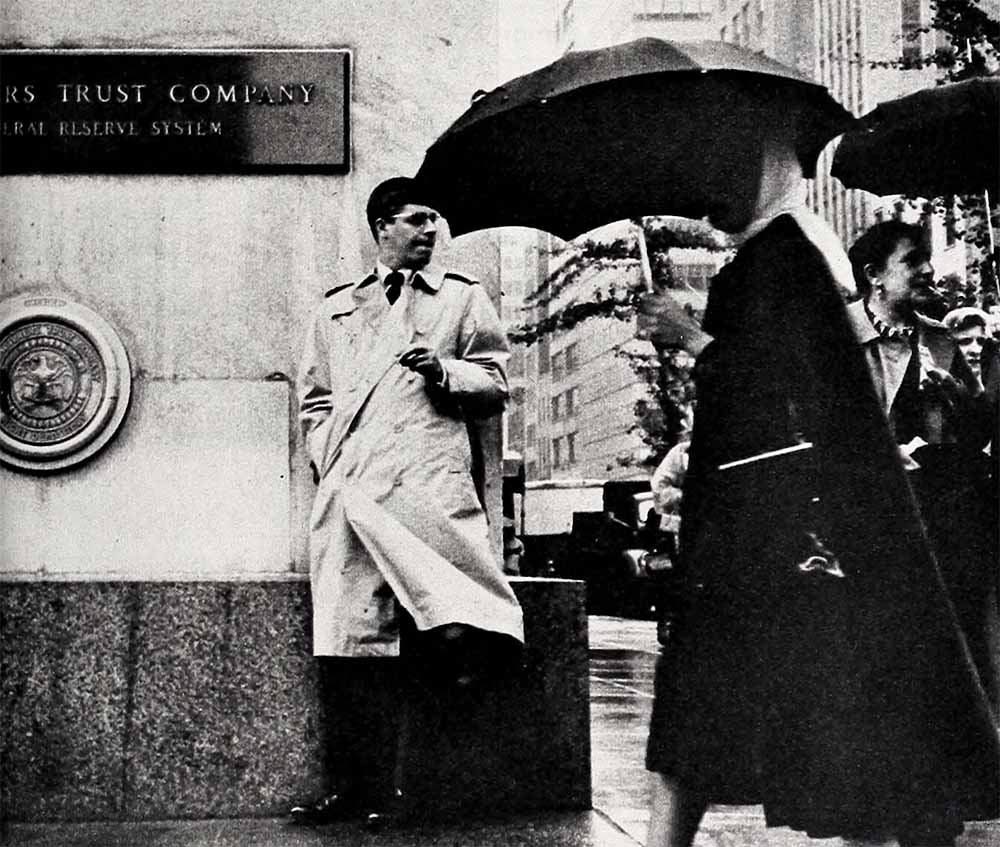
Jerry walked towards the door and stopped in front of a female dummy. “Did p you catch that, Babe?” he asked the mannequin, talking out of the side of his mouth. “‘Mister Lewis’ again. They don’t think I’m Jerry Lewis. They think I’m Jerry Lee. So they’re playing it cool. Keep your eyes open, Babe, and report everything to me. And if they give you the third degree, don’t talk. Dummy up.”
Across the aisle, he addressed a male dummy. “Hello, Bruce, what’s new? Look, keep an eye on Babe. I don’t trust her. Think she’s sold out to Jerry Lee. And that manager. Watch him. He’s destroyed all the Sherlock Holmes hats in the city. He’s part of the plot. They’re all part of the plot.”
Back in the car, Jerry slumped in the seat and was quiet. Crosstown traffic was heavy. Suddenly Jerry started talking again, but he was still slumped down in his seat and it was as if he were speaking to himself. “You know I really have nothing against this guy, this Jerry Lee Lewis. All I know about him is what I’ve read in the papers, or learned from fans who confuse him with me. I’ve never heard his records, never seen him perform, never met him. It’s just that my life’s so different from his. Not better—I’d never say that, just different.
“Take the way Jerry Lee proposed to his cousin. According to the papers, he was driving Myra to Memphis to see a picture he’d made. Suddenly he said, ‘Let’s get married,’ and she answered, ‘Let’s go.’ Quick. Just like that.
“Well, that got me to thinking about how I courted Patti. She was a singer in Jimmy Dorsey’s band and I was a young comic. In Detroit we played on the same bill and that’s where we met. We met again after that in New Haven, Boston and New York. We went out together and had fun. I was crazy in love with her. But I didn’t have the nerve to ask her to marry me. Onstage, nothing bothered me. Offstage, I was loud and brash—except when I was with Patti. Then I was like jelly.
“So one day I went to a kids’ store and bought a tiny pair of baby shoes. While Patti was onstage, I sneaked into her dressing room, hung the shoes on the mirror, and wrote on it with lipstick, ‘WHAT DO YOU SAY WE GET MARRIED AND FILL THESE?’ And then it was time for me to do my number.
CLUE no. 4
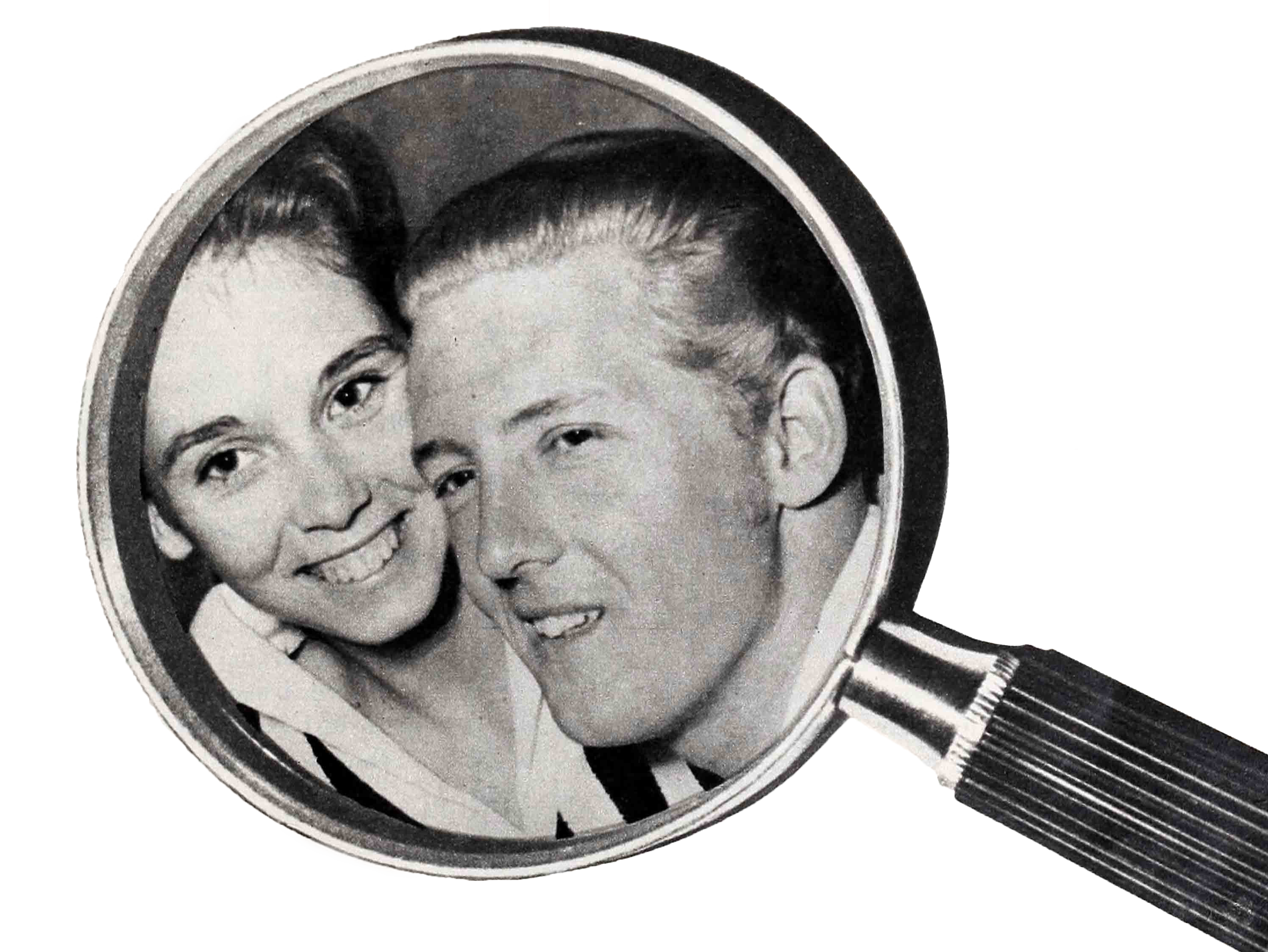
“In the middle of my routine I suddenly realized I had forgotten to sign my name to the message I had written on her mirror. What if she didn’t know I wrote it? I’d never have the nerve to ask her again, either out loud or in writing. So I stumbled through my act and sneaked back to my dressing room. I just sat there a while in the dark, feeling the world had come to an end.
“Finally I got up to take off my costume. I switched on the light and turned to the mirror. There, in big letters, was written, ‘WHAT TOOK YOU SO LONG? PATTI.’
“Now we’ve been married for fourteen years and we’ve filled four pairs of baby shoes!”
Jerry sat up straight and crowed at the driver, “Listen to me—the comedian trying to play Hamlet. Or worse yet, Romeo.
“Joe,” he said. “I want to stop at Tiffany’s.”
Inside New York’s swankiest jewelry store, Jerry headed for a showcase filled with religious medallions. He selected two golden St. Anthony medals and asked the salesman to wrap them in separate boxes. “St. Anthony is Patti’s patron saint,” he explained to us. “I want them put in different boxes so we’ll have the fun of opening our individual packages together.”
“What’s the occasion, Jerry?” we asked.
“Nothing special,” he answered quietly. “I just love her.”
Just then someone who looked like a store manager is supposed to look came rushing over, with two assistants. “You can’t do that, Mr. Lewis!”
“Part of the Jerry Lee mob,” Jerry whispered. Then, to the manager, “What can’t I do?”
“Take pictures in Tiffany’s,” he replied, pointing to Photoplay’s photographer, who had his camera aimed at Jerry.
“Okay,” said Jerry, “so Jerry Lee wants to play rough, huh? tell him I’ll get him for this.”
“What?” asked the manager.
“What?” echoed his assistants.
But Jerry Lewis was on his way out the door.
Outside the bank on the opposite comer, Jerry loitered, watched the crowd hurrying past. “Any one of those people may be Jerry Lee in disguise. Maybe the manager at Tiffany’s is really Jerry Lee. Maybe Joe’s Jerry Lee. Maybe I’m Jerry Lee.” He rapped on the night-deposit box and snarled, “I know you’re in there. Come on out or I’ll come in after you. Or if the two of us won’t fit, I’ll hold up the bank to smoke you out.”
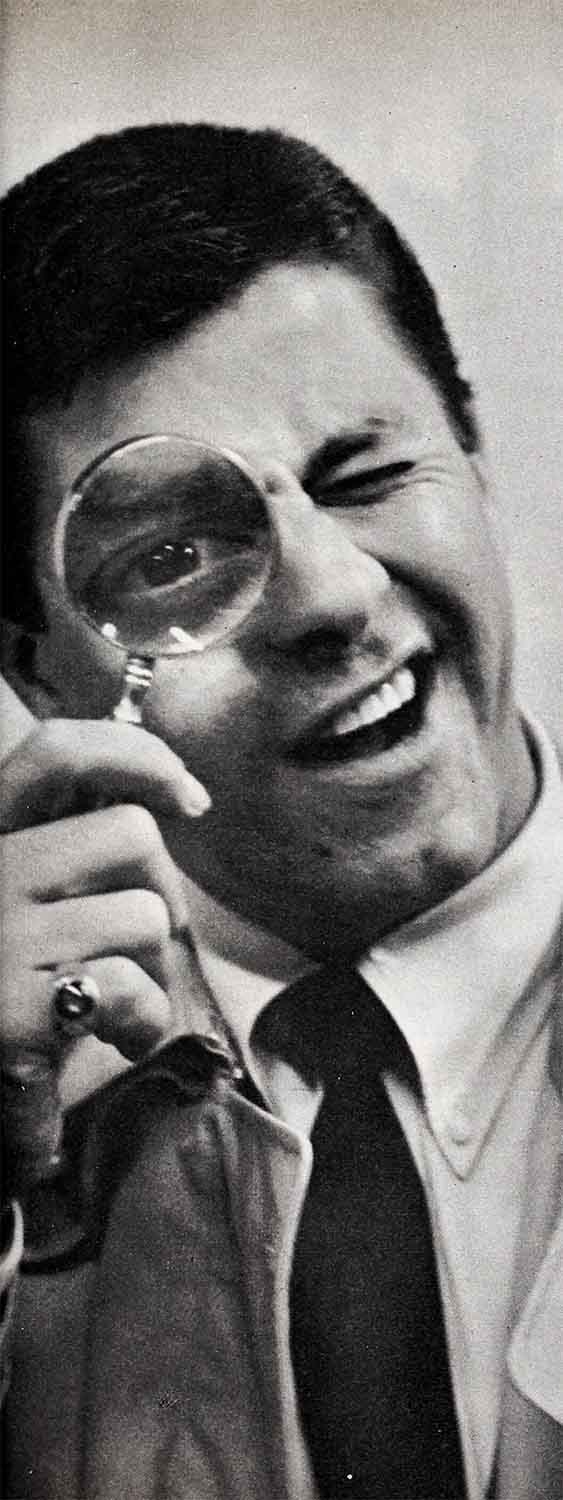
He walked across the Street to the car. “Step on it. I’m going it alone—to the club.”
On the way to the Cafe de Paris, where he was to do two special shows that night, Jerry dropped into a Western Union office to send a wire. He signed it “The original Jerry Lewis (not doing business under any other name).”
Then he came to a record store. “Let’s go in,” he said. “What’s your latest record by Jerry Lee Lewis?” he asked the clerk.
“ ‘Dormi, Dormi’ ” was the answer. And out came the waxing of the lullaby from “Rock-a-Bye Baby,” Jerry Lewis’ latest movie.
“Ah-hah!” Jerry chortled. “The tide is beginning to turn. Now they’re blaming Jerry Lee for the things we done. I can see it now, Jerry Lee being bombarded with letters from his fans, all asking: ‘How could you jilt your thirteen-year-old cousin and run off with the mother of four children?’ Let him try to explain!”
“Here’s another one, sir.” The clerk gave Jerry a copy of Jerry Lee Lewis’ recording of the theme song of “High School Confidential!”
“Well, this isn’t mine. Now we’re getting somewhere.” Jerry took the record into one of the little booths, put it on the player and closed the door. Through the glass he could be seen listening. Abruptly, he came bursting out. “I’ve heard that before! At home. Hundreds of times until I thought I was going out of my mind. Gary plays it. He loves rock ’n’ roll. I never knew who was singing it. But now I know. Gary, my own son, he’s gone over to the enemy! He’s a Jerry Lee Lewis fan!
“Who did I sound like before when I was talking about Patti in the car? Hamlet? Romeo? Well, call me King Lear! My own child, Gary, my firstborn, has betrayed me. Curses!”
“How did you like the record?” the clerk asked.
“The guy’s good,” Jerry said. “Sings loud, good beat, really belts it out. What? What am I saving? Don’t listen to me. I’m not myself. Who am I?”
On the Street, Jerry took a look at his watch and hailed a cab. “Cafe de Paris,” he said to the driver, “and fast. I’m late.”
“Going to pick up your money, Jerry?” the cab driver asked.
“What did you say?” Jerry found the man’s name on the Identification card that faces the passengers. “What did you say, Sam?”
“Just inquired whether you’re on your way to pick up your money,” the driver replied.
“What money, Sam?”
“The money you got for performing at the Cafe de Paris, Jerry.”
“But I haven’t performed there yet,” Jerry said, “and I’m not getting paid. I’m doing two shows tonight for free as a favor to my old friend Lou Walters. It’s his place. He had a heart attack.”
“Don’t kid me. I know you were there a coupla weeks ago. Me and the missus always read the columns.”
“Stop! Cease. Desist,” Jerry interrupted. “I’m Jerry Lewis. You’re talking about Jerry Lee Lewis.”
The cab stopped at the Cafe de Paris and Jerry got out. “See what I mean?”
That night we met Jerry in the hail of his club and went with him to his dressing room. “Haven’t had time to get my stuff in here before this,” he said, turning on the lights. “I’ve been busy . . . Yow! He’s here. He’s here!”
There, against the wall, was a life-size cardboard cut-out figure of Jerry Lee Lewis. “Get him out of here. I’m surrounded by assassins.”
Jerry Lee, left over from two weeks before, was removed. Then Jerry went out to face the audience of more than a thousand who had crowded into the first show. His opening line was: “My name is Jerry Lewis; I have no middle name; I’m married to an adult.” It was the same thing he had said that morning to the president of the Brooklyn Jerry Lewis Fan Club. But this time the line got a laugh.
After the show, a girl approached our table with her father. She was obviously out later than she should be; her dad apologetically muttered something about “celebrating her graduation from junior high school.” But she was focusing all her attention on Jerry.
“Oh, Mr. Lewis,” she said. “Would you sign an autograph for me? Here. On the menu. Just say, ‘With love to Claire Williams.’ Gee! Thanks. I’m crazy about your records—‘Crazy Arms!’ ‘High School Rock’ and all the rest. You’re the most!”
“—Wait!” yelled Jerry. But she was gone. With a despairing look, he drummed his fingers on the back of the chair. “Well,” he finally said, “I hope she reads the October issue of Photoplay.”
“I hope so, too,” I answered, and got up to leave, telling him we’d keep after it.
Here then, Jerry Lewis, is my report. Here’s the ending to our story:
In Ferriday, Louisiana, I talked to Jerry Lee’s mother, Mary Ethel Herron Lewis, who told me that Jerry Lee had been born in Ferriday on September 30, 1935. “Jerry Lee Lewis is the name we gave him on his birth certificate,” she answered me. “I gave him the name Jerry, and his pa, Elmo, gave him the name Lee. I named him Jerry after a silent-picture movie star—I can’t remember his last name now—who I was crazy about before I married Elmo. Elmo named him Lee after Jerry’s uncle, Lee Calhoun, the richest man in Ferriday.”
That was that, or was it? You had wanted to see Jerry Lee in person. That was the next step. I had to see Jerry Lee himself. In Memphis, I tracked him down. Jer, you would have been proud of me. But you wouldn’t have liked what Jerry Lee had to say. “I went by the name Jerry Lewis until I started making records,” he said. “Then, to avoid confusion with that other Jerry Lewis, I started using my middle name, Lee. Man, I certainly don’t want people to mix me up with that cat!”
Where now? To New Orleans, of course, where all Louisiana births are on file. And there I’ve found it—the answer for Photoplay and you. Jerry Lee Lewis is Jerry Lee Lewis. There’s no fooling the government, Jer. There in black and white! “Name . . . JERRY LEE LEWIS.”
—JIM HOFFMAN.
It is a quote. PHOTOPLAY MAGAZINE OCTOBER 1958
AUDIO BOOK




